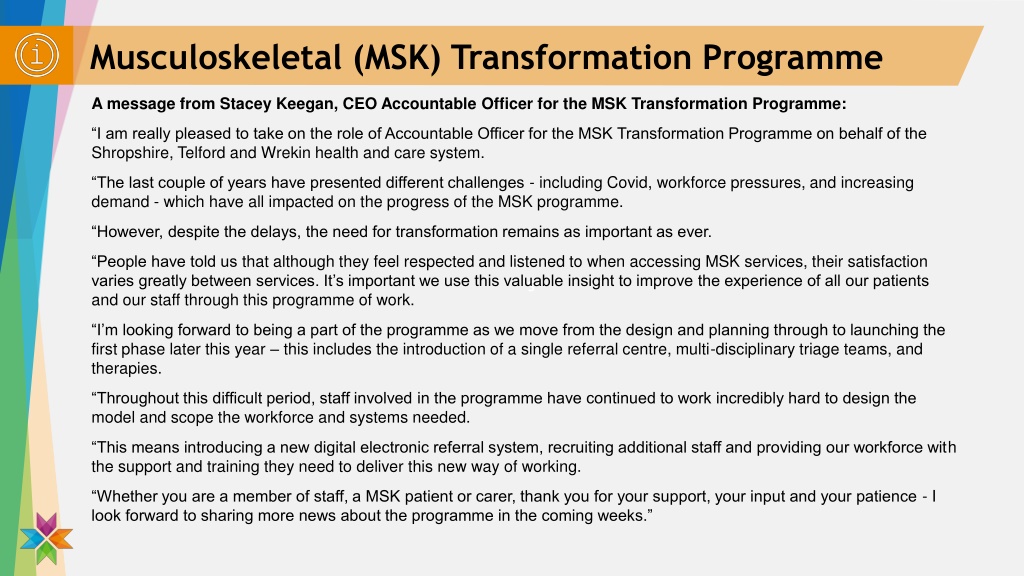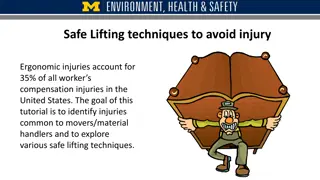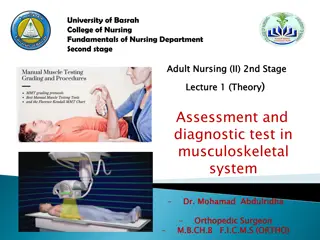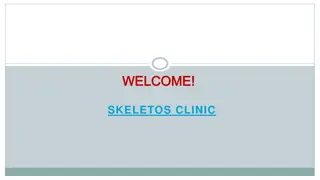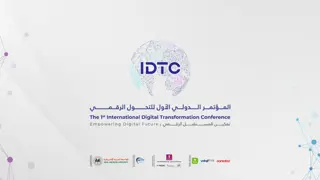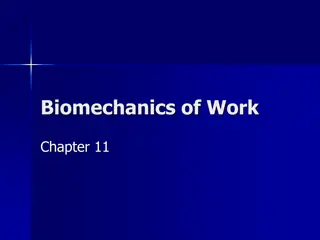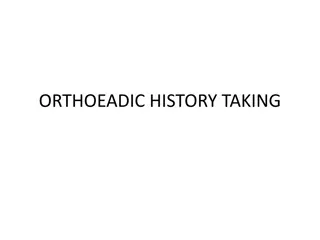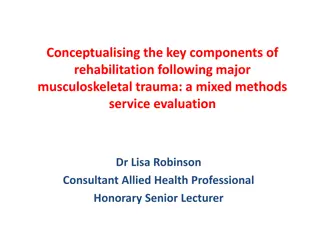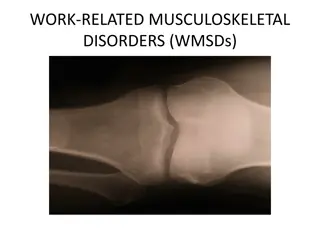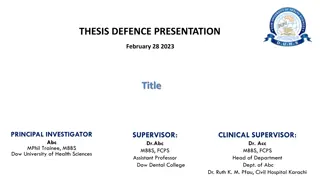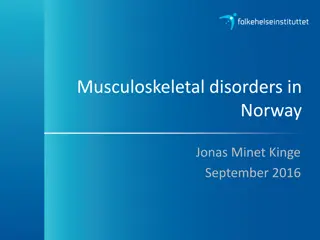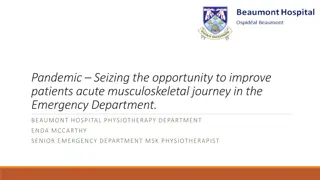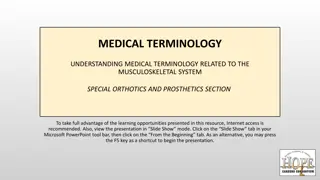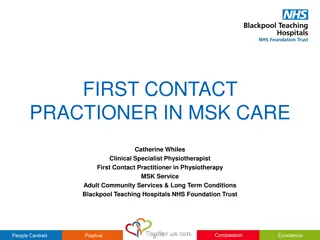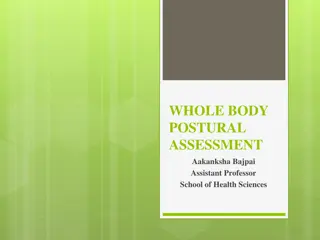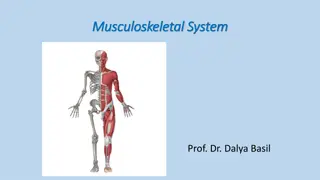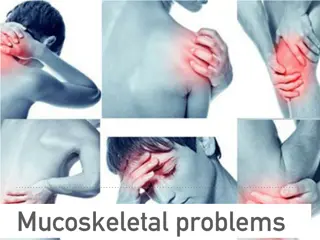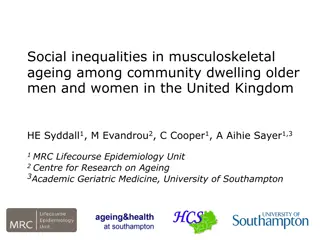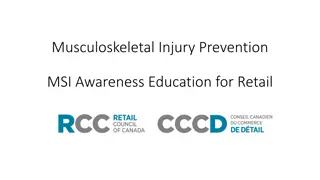Musculoskeletal Transformation Programme Overview
Stacey Keegan, CEO, outlines the importance of the Musculoskeletal Transformation Programme in Shropshire, Telford, and Wrekin. Despite challenges, the goal is to enhance patient experience by implementing new referral processes, triage teams, and therapies. The programme aims to streamline services, improve staff support, and launch new initiatives over five years. With a focus on community care, the programme addresses the evolving needs of an aging population with MSK conditions.
Download Presentation

Please find below an Image/Link to download the presentation.
The content on the website is provided AS IS for your information and personal use only. It may not be sold, licensed, or shared on other websites without obtaining consent from the author. Download presentation by click this link. If you encounter any issues during the download, it is possible that the publisher has removed the file from their server.
E N D
Presentation Transcript
Musculoskeletal (MSK) Transformation Programme A message from Stacey Keegan, CEO Accountable Officer for the MSK Transformation Programme: I am really pleased to take on the role of Accountable Officer for the MSK Transformation Programme on behalf of the Shropshire, Telford and Wrekin health and care system. The last couple of years have presented different challenges - including Covid, workforce pressures, and increasing demand - which have all impacted on the progress of the MSK programme. However, despite the delays, the need for transformation remains as important as ever. People have told us that although they feel respected and listened to when accessing MSK services, their satisfaction varies greatly between services. It s important we use this valuable insight to improve the experience of all our patients and our staff through this programme of work. s I m looking forward to being a part of the programme as we move from the design and planning through to launching the first phase later this year this includes the introduction of a single referral centre, multi-disciplinary triage teams, and therapies. Throughout this difficult period, staff involved in the programme have continued to work incredibly hard to design the model and scope the workforce and systems needed. This means introducing a new digital electronic referral system, recruiting additional staff and providing our workforce with the support and training they need to deliver this new way of working. Whether you are a member of staff, a MSK patient or carer, thank you for your support, your input and your patience - I look forward to sharing more news about the programme in the coming weeks.
Summary Overview Key Data Next Steps New programme leadership appointments: The MSK Transformation Programme is about strengthening community provision to improve the care that people receive. This work is being taken forward in collaboration between local health and care organisations, including: Shropcom; RJAH; SaTH; and the CCG Accountable Officer - Stacey Keegan, Chief Executive Officer at The Robert Jones and Agnes Hunt Orthopaedic Hospital Interim Director of Strategy and Partnerships Nigel Lee, The Shrewsbury and Telford Hospital NHS Trust Final business case shared with the new leadership team end of May. The services and the treatment options available will remain the same. Although staff will work more closely with teams from other providers, they will continue to be hosted by their current employer (TUPE will not apply). s It will be delivered in three phases over five years starting with the referral process, triage, therapies and rheumatology. An updated implementation plan will be taken to The MSK Transformation Programme Board in June. Approval for the workforce sharing agreement so that staff can work more flexibly. Agree and communicate a launch date. The programme only includes patients referred by GPs or Consultants within Shropshire, Telford and Wrekin. In our recent patient survey, patients across all treatment streams agreed that the proposed changes would deliver an improved experience. Address the current waiting lists. Continue to embed the learning from the patient survey.
Reasons for change The population of Shropshire, Telford and Wrekin is ageing, and more people are living with long term conditions. Musculoskeletal (MSK) conditions account for 30 per cent of GP consultations in England. Low back and neck pain are the greatest cause of years lost to disability in the UK, with chronic joint pain or osteoarthritis affecting more than 8.75 million people in the UK. We have looked at patterns across a person s journey in MSK services and found that some people need care and treatment from multiple services, for example orthopaedics and physiotherapy, which have different ways of referring people, recording information, and running their services. This has led to people s experiences being different depending on how and where they access services, with individuals and staff often feeling frustrated by the time it takes for information to be passed from one service to another, resulting in delays to care and treatment. s Often a person is sent back to their GP to make a further MSK referral rather than the services working together to ensure their needs are met. This is inefficient in terms of waiting time, capacity and cost for both the NHS and the individual. Patient feedback also tells us that this often leaves them feeling as though they are being treated as separate parts rather than as a whole person. According to our recent survey, people feel respected and listened to when they are undergoing treatment. However, satisfaction with diagnosis and treatment within Shropshire, Telford and Wrekin varies greatly between services. People spoke of experiencing delays from referral to treatments and inconsistent and disjointed care, with a lack of continuity. The current model of delivery is unsustainable for the future, and we are unlikely to be able to afford future demand for services if they continue to be delivered in the current way.
What this means for patients Reduced waiting times for first appointments. Access to the right care first time. Smoother transfers between services. Equitable access to services across the county. s Better support to manage their own conditions through self-care and earlier therapy support. Reduced need for surgery.
What this means for staff A simpler and easier referral pathway. Access to high quality advice and guidance. Multi-disciplinary working. Patients will be seen in the right place first time. s Shared patient information for smoother transfers between services. If you have any questions or comments, please raise them with your line manager.
Phases of the programme Phase 1 (Year 1) Referrals: Introduce a referral centre which will be the single point of access for all referrals and general enquiries across the county. Triage: Teams of specialists will assess and diagnose every person so that they are signposted to the most appropriate treatment, when it s needed, to reduce waiting times for first appointments. Self-care: People will be better supported to manage their own conditions through access to advice and information. s Therapies: Earlier access to therapies. Advice and guidance: All our staff will have access to a virtual MSK multi-disciplinary team to provide advice and mentoring. Rheumatology: A strengthened rheumatology service - building on best practice, reducing inequalities in service provision, and improving our rheumatology helpline. Digital: The future service will make better use of digital solutions.
Phases of the programme The new model: Phase 2 (Year 2 to 3) Enhance our orthopaedics services. An outpatients improvement project. Strengthen the support available for Primary Care. Potential work to focus on falls, fractures and osteoporosis. s Phase 3 (Year 4 to 5) A focus on the support for people with long term MSK conditions. Develop self-management models. 7
Whats happened so far Work to transform MSK started in January 2020 following approval for the development of a MSK Alliance. The MSK Alliance is now known as the MSK Transformation Programme. The work is being taken forward through various groups made up of representatives from clinical and operational teams supported by Finance, People, Estates and Digital services. We have started with phase 1 which includes referrals, triage and therapies. s We have looked at the demand for the services, staffing need, operational hours, and the digital systems to establish what is needed to deliver phase 1. We have sought the views and experiences of people using our services to shape the programme and have shared this insight with our staff to embed the learning.
Road Map W o r k w a s t e m p o r a r i l y p a u s e d d u e t o C o v i d - 1 9 Jan 2020 S t a r t m a p p i n g t h e f u t u r e m o d e l a n d p h a s e 1 i m p l e m e n t a t i o n p l a n , i n c l u d i n g w o r k f o r c e , f i n a n c e , o p e r a t i o n s , d i g i t a l , e s t a t e s a n d p u b l i c e n g a g e m e n t March 2020 July 2020 W o r k b e g a n o n t h e t r a n s f o r m a t i o n o f M S K s e r v i c e s t o r e v i e w c u r r e n t s e r v i c e s s C o m p l e t e t h e f u t u r e d e m a n d m o d e l l i n g a n d w o r k f o r c e p l a n a n d w o r k w i t h p e o p l e t o d e v e l o p p u b l i c c o m m u n i c a t i o n s A g r e e t h e f u t u r e m o d e l a n d s y s t e m - w i d e e l e c t r o n i c p a t i e n t r e c o r d s y s t e m ( R i O ) Aug/sept 2021 Dec 2021 Oct/Nov 2021 L a u n c h p h a s e 1 2022 W o r k f o r c e m a p p i n g a n d p u b l i c a n d c l i n i c i a n e n g a g e m e n t e x e r c i s e s
